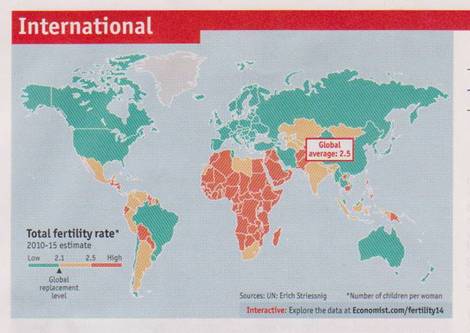
Somebody sees a bright side to collapse:
“It’s an ill wind that blows nobody good,” is a proverb. Notice that it doesn’t say a rare wind. However I should think that gazing at looming extinction would not soothe even an optimist. I was wrong. (Quality Time ECONOMIST vol. 411 no. 8889 May 31, 2014 page 53 citing work by Stryssnig and Wolfgang Lutz of the Vienna University of Economics and Business and the Business and International Institute for Applied Systems Analysis in Laxenbug, Austria)
The article starts off reasonably enough pointing out that birth rates are low in the developed world and falling elsewhere. They even have a map:

Green means below replacement. Red means above and yellow is marginal.
I would have reversed that, of course. Red usually means a problem and green is reassuring. The article goes on to say that, quite reasonably, two thirds of countries in more developed regions have policies for increasing the number of babies. This is applauded as being almost successful in Sweden and France, but dismally unsuccessful in Germany at births per woman of 1.4 (You do remember the Third Reich. The policy was really to mix all Germans into a super race. The might recover some day, but they certainly haven’t yet.) And the US is not so far below replacement in spite of any policy to encourage having babies.
This we have all known for years. What is new is the sanguine suggestion that we don’t need all those babies anyway. The experts cited have calculated that because highly educated people live longer and are more productive, you only need a reproductive rate of 1.5 to 1.8 in the long run, even ignoring the “benefits” of immigration. (I put that in quotes because immigration means taking people out of their ancestral villages – where they just might find biologically suitable mates – and putting them among strangers – where it is impossible. And of course there is the reciprocal damage done to the host communities.)
Really. They think long term 1.5 would be dandy. There is no breath to the effect of, “Of course we must fix this one day.” No, eternal decline – provided that everybody is educated – is not only ideal but possible.
Of course it is not. And of course it is the educated who have the broad and hence lethal social pool. They’re going to croak first.
At least the ECONOMIST is keeping this all in mind. And most developed countries are working at it, however ineffectively. Oh for a muse of fire! Could I but get them to listen. Not today but who knows? And there might just be enough time left to fix it, although I am getting more and more doubtful of that.
There have been 70 visitors over the past month.